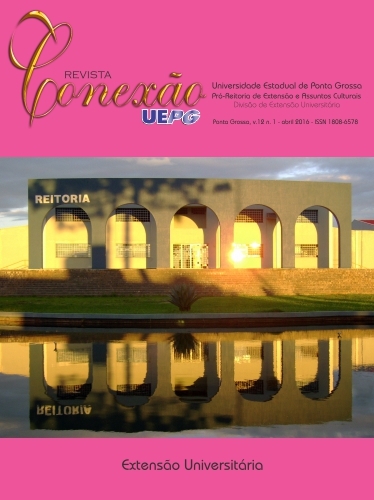HEALTH EDUCATION AS AN APPROACH TO WORK AT SUS: A CASE STUDY – DOI: 10.5212/Rev.Conexao.v.12.i1.0005
DOI:
https://doi.org/10.5212/Rev.Conexao.v.12.i1.0005Keywords:
Rights to health, Social control, Health education.Abstract
The aim of the outreach project “Health and Citizenship: Recreating Social Reality” is to develop health communication methodologies, as well as characterize the approach used in different spaces taking popular health education as the starting point in order to unveil the rights of users of Sistema Único de Saúde (SUS) and the ways to access it. The project is intended to create easy and playful tools, such as dramatic games, theater, round tables and board games activities. The activities are carried out in Health Units, Specialty Centers, Fighting Cancer Units, housing and social institutions. Among the games, it is worth mentioning “SUS Roads”, which is an enlarged board game that allows interactivity and dialogue, with and among users, about their rights and duties regarding health services. It enables them a way to materialize the information, learn and experience how SUS operates.Downloads
References
BRASIL. Diário Oficial da União. Lei nº 8080/90. Dispõe sobre as condições para promoção, proteção e recuperação da saúde, a organização e o financiamento dos serviços correspondentes e da outras providências. Brasília ¬ DF, 19 de setembro de 1990.
______. Diário Oficial da União. Portaria nº 2.761, de 19 de novembro de 2013. Institui a Política Nacional de Educação Popular em Saúde no âmbito do Sistema Único de Saúde (PNEPS-SUS).. Brasília ¬ DF, 19 de setembro de 1990.
¬______. Diário Oficial da União. Lei 8142/90. Dispõe sobre a participação da comunidade na gestão do Sistema Único de Saúde (SUS) e sobre as transferências intergovernamentais de recursos financeiros na área da saúde e dá outras providências. Brasília ¬ DF, 28 de dezembro de 1990.
______. Ministério da Saúde. Secretaria de Gestão Estratégica e Participativa. Departamento de Apoio à Gestão Participativa. Caderno de Educação Popular e Saúde. Brasília: Ministério da Saúde, 2007.
CFESS. Parâmetros para a Atuação de Assistentes Sociais na Política de Saúde. Disponível em: <http://www.cfess.org.br/arquivos/Parametros_para_a_Atuacao_de_Assistentes_Sociais_na_Saude.pdf>. Acesso em: 19 mai. 2015.
COSCRATO, G.; PINA, J. C.; MELLO D. F. de. Utilização de atividades lúdicas na educação em saúde: uma revisão integrativa da literatura. Disponível em: <http://www.producao.usp.br/bitstream/handle/BDPI/2945/art_COSCRATO_Utilizacao_de_atividades_ludicas_na_educacao_em_2010.pdf?sequence=1&isAllowed=y>. Acesso em: 20 jan. 2015
MENDES, Eugenio Vilaça. Uma Agenda para a Saúde. Editora Hucitec. São Paulo-SP, 1996.
PEREGRINO, Mônica. Uma questão de Saúde: saber escolar e saber popular nas entranhas da escola. In: VALLA, Victor Vicent (org). Saúde e Educação. DP&A. Rio de Janeiro, 2000
TEIXEIRA, C.F; SOUZA, L.E.P. F de; PAIM, J.S. Sistema Único de Saúde (SUS): a Difícil Construção de um Sistema Universal na Sociedade Brasileira. In: PAIM, J.S; FILHO, N. de. A. Saúde Coletiva: Teoria e Prática. 1ed. Rio de Janeiro: Med Book, 2014.
TEIXEIRA, E. R; VELOSO, R.C. O grupo em sala de espera: território de práticas erepresentações em saúde. Revista Texto Contexto, Florianópolis, v.15, n.2,p. 320-325, 2006.
WERNER, R. C.; Ferreira, E. S.; CARRIEL, M. C.; TOMAL, T. de A. A Experiência de Educação em Saúde em Ambulatório Hospitalar. IN: 4º CONGRESSO INTERNACIONAL DE EDUCAÇÃO PESQUISA E GESTÃO, 2012. Ponta Grossa. Disponível em: <http://isapg.com.br/2012/ciepg/down.php?id=2736&q=1>.
VASCONCELOS, E. M.Educação Popular: de uma Prática Alternativa a uma estratégia de Gestão Participativa das Políticas de Saúde. PHYSIS: Rev. Saúde Coletiva, Rio de Janeiro, v. 14, n.1, p.67- 83, 2004.
Downloads
Published
Issue
Section
License
a) Authors retain copyright and grant the journal right of first publication with the work simultaneously licensed under a Creative Commons Attribution License that allows others to share the work with an acknowledgement of the work's authorship and initial publication in this journal.
b) By submitting an article to the Revista Conexão UEPG and having it approved, the authors agree to assign, without compensation, the following rights to the Journal: the rights of first publication and the rights to redistribute the article and its metadata to the indexing and reference services that the editors deem appropriate.
c) Readers are free to transfer, print out and use the articles published in the Journal, as long as there is always explicit mention to the author(s) and to the Revista Conexão UEPG and as long as there is no alteration of the original work. Any other use of the texts needs to be approved by the author(s) and by the Journal.






